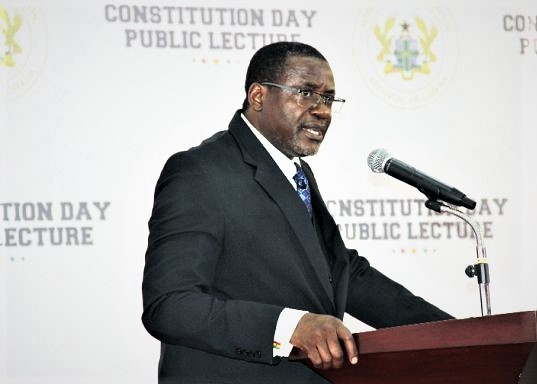Economic growth and support of government business would experience a major boost if recruitment into the civil service and the upgrading of civil servants is hinged on merit and not long service, as it currently persists, Professor Philip Ebow Bondzi-Simpson, Rector of the Ghana Institute of Management and Public Administration (GIMPA), has said.
According to him, acceleration of economic growth –just as China and Singapore have shown– hugely depends on the quality of human resources the government is able to attract depending on the incentives and progress plan established.
Speaking at a public lecture organised to commemorate the 2020 Civil Service Week and Awards Ceremony, Prof. Bondzi-Simpson said: “We should place a premium on recruiting the right people, qualified and subjected to intensive testing, being put through rigorous training and progression. It should be structured and fair and earned on the basis of merit only and not favour or long service.”
Currently, unless for special reasons, it takes three years for a civil servant to apply for promotion and one would have to pass a promotional examination and an interview.
Touching on the theme of the week-long celebration: ‘Civil Service and Private Sector Synergy: A National Development Imperative’, Prof. Bondzi-Simpson said the nation can learn a lot from the Chinese and Singaporeans where they empowered the public sector to provide the needed support to the private sector through the recruitment of qualified personnel to spur growth.
Since independence, he noted, the nation’s civil service has been faced with numerous challenges with successive governments but the stability enjoyed since the beginning of the 4th republic makes it the opportune time to make professionalism and meritocracy the pivot of the service.
“From the first regime till now, has professionalism and meritocracy necessarily been the hallmark of the civil service? It may be a difficult question to pose and the politician may not like to ask or answer it. The civil servant may not like to ask or answer it so perhaps an academic should. But in my respectful view, the interferences, for not all the time the best reasons, have not advanced the course of the country.
They may have advanced the course of some of the individuals concerned whether engaged or disengaged and they may have advanced the course of the political regime in question but they may not have advanced the course of the country. I believe in this constitutional dispensation, we must be candid and frank with ourselves and work towards professionalism and meritocracy,” he said.
According to him, this must begin with a mental orientation of all public servants. “How do we, especially as civil servants, consider our role and our place? Who is the civil servant? Is he or she the high earning top bureaucrat or does the cleaner or helper or driver at the ministry also considers him or herself as a civil servant.
In whatever role we play, as we recognise that we are officers of the state advancing the course of the state, this mental orientation would assist us all considerably. Perhaps, a structured orientation pre-service and a continuous orientation is required for that state of mind.”
He added that international standards, best practices and ethics must be employed to ensure that the aim to transform the public service is achieved in a much quicker time.
Chief of Staff, Akosua Afrema Osei-Opare, who chaired the public lecture, reiterated the government’s commitment to support the civil service to deliver first class service to all citizens and the private sector for the good of the public.










